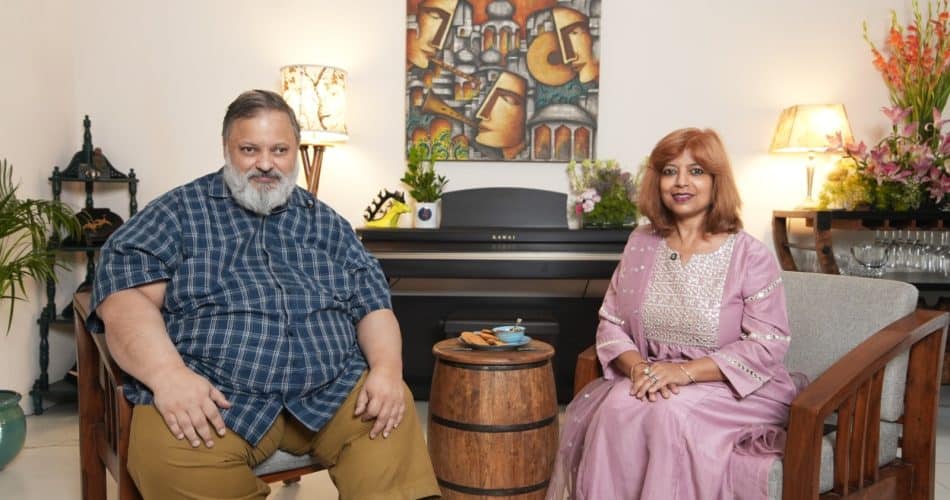Sarika Gupta attempted – unsuccessfully – to become a home chef twice before she connected with We The Chefs in 2021. Since then, there’s been no looking back.
A champion of vegetarian cooking, Sarika’s repertoire extends from Old Delhi’s famous chaats to Lebanese falafel and mezze platters, and although she lives in Faridabad, an industrial town neighbouring Delhi, she has people eating out of her hand, literally, in places as far off from her home as Ghaziabad, Gurgaon and Rohini in Delhi’s north-west. She’s also on Amazon, where she retails her home-made packaged foods, notably her to-die-for mathri, accompanied by her specialty mango pickle.
On ‘Food Talk with Sourish’, Sarika attributes her success in her third attempt to become a home chef to four factors:
- The exposure provided to her by We The Chefs, which, she said, is the kind of platform she did not have access to in the time before the social media boom.
- Her ability to minimize her fixed costs by doing everything needed in her home kitchen – and not investing in a commercial setup or hiring additional staff. She is the designated cook, her gardener doubles as halwai (it’s a talent that Sarika has enabled), and her driver also pitches in. If she needs more people for specific tasks, she hires them per assignment according to her needs.
- She is also very careful about maintaining the highest hygiene standards as well as being regular with her social media exposure – for the second task, her daughter Varsha, an Accenture executive whom she describes as “a big part of my success”, helps her style her food and shoots pictures that are Instagram worthy.
- And of course, there’s no escaping hard work when one chooses to become a home chef. Sarika sometimes has to work non-stop from 3 a.m. till 12 midnight when she has to prepare an order for a party, but she knows that she can take it easy on the next day. There’s no slowdown, however, because there’s always a steady flow of orders – from laddus in the winter, to loads of gujiya during Holi and Diwali, to party treats throughout the year.
Sarika is such a dedicated vegetarian that although she grew up across the street from the iconic Moti Mahal restaurant in Daryaganj, she has never been to it. Instead, she has sampled all the chaats, kachoris, samosas, aloo tikkis and chhola-bhaturas that would be served piping hot on a lane opposite her house when she was growing up. It used to be called ‘Romeo Lane’ because boys and girls out on a date would crowd it after 6 p.m., enjoying the delicacies being served fresh off the kadhai.

The younger Sarika would also frequent Chawri Bazaar and Khari Baoli in what Delhiwallahs call ‘Dilli-6’, where she would get to dig into authentic chaat and samosas served with a sweet chutney made with either imli (tamarind) or amchoor (dry mango powder). Unsurprisingly, she bemoans the loss of that authentic taste because imli and amchoor have been replaced with cornflour and sugar.
Likewise, the kachalu (sliced taro) she insists on using in her papri chaat, in the time-honoured tradition of Purani Dilli, is missing from what is served commercially today. Kachalu lifts the taste of food, Sarika insists, besides ensuring authenticity.
With so much food around her, and having grown up in a food-loving Marwari family from Bhiwani, Haryana, Sarika looks back at how she used to be encouraged by her mother to cook food even before she reached her teens. “By the time I was 10, I was cooking regularly,” she remembers fondly. Her home, incidentally, was two floors above the school she went to, so she got plenty of time to cook!
It is this lifelong passion for cooking good food that Sarika brings to the table and she believes that people, especially in the post-Covid world, have started appreciating and trusting home chefs like her. “People trust us because they know they are getting home cooked fresh food,” Sarika says. “You won’t find, for instance, any food stocked up in my refrigerator because I do not believe in using ingredients kept in the deep freezer or serving re-heated frozen food.”
Having found takers for her packaged snacks on Amazon, Sarika’s big dream now is to set up a production unit to roll out her mathris and other drying namkeens, atta ke laddus and gujiyas. It is easy, she says, to scale up this part of her operations because the items have set recipes, whereas when she’s catering, the recipes vary according to the specificities of each order. “This is the place where I can grow,” Sarika says, referring to her big dream. “That is the place where I can earn a name for myself,” she adds, pointing to her life as a caterer.

